How To Treat Dandruff With Salt
The solution to those troublesome flakes may be simpler than you think.

Image: iStock
Is it possible to get rid of dandruff with salt? How to treat dandruff with salt?
Everybody has experienced a flaky scalp at some point in their lives. It is one of the most irritating experiences a person can have. Although the problem is not directly related to inadequate hygiene, we do not want it to be brought up.
Also, dry scalp and dandruff are often confused. Dandruff is mainly caused due to Malassezia fungus. This fungus is on the same page as athlete’s foot and is typically very oily, flaky, and stinky, while a dry scalp is just flaky. Salt is an excellent way to treat both but there is a little more treatment that is needed to treat dandruff.
You could be one of the lucky ones who get flare-ups now and then, or you could have chronic dermatological disorders like seborrheic dermatitis that never really fades away. In either case, salt aids dandruff treatment and alleviates its effects. Here’s how to use salt for dandruff. Scroll down.
In This Article
How Does Salt Get Rid Of Dandruff
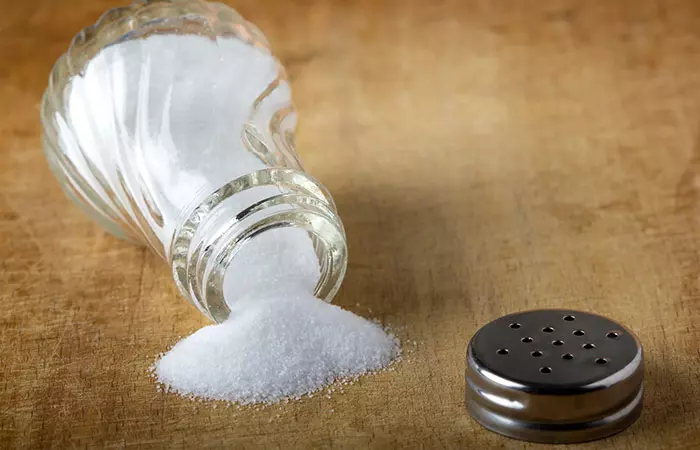
- Pore clogging is one of the biggest causes of dandruff. Salt may help loosen up the flakes on your scalp by exfoliating it (1). Scalp exfoliation using salt can allow you to get rid of the built-up dead skin and, in turn, helps clean your scalp and unclog your pores.
- Excessive oiliness can sometimes cause dandruff. The excess production of sebumi The sticky and oily substance made of various fat molecules and squalene to protect and moisten the skin. from your sebaceous glandsi Microscopic glands in the skin that open into hair follicles and secrete sebum to moisten and prevent skin dryness. can end up clogging your pores and irritating your scalp. Salt helps tackle sebum buildup by absorbing the excess oil from your scalp. Anecdotal evidence suggests that salt may help tackle this issue by absorbing the excess oil from your scalp.
- Living in humid conditions and active sweat glands can cause your scalp to be constantly moist. This can lead to fungal growth and dandruff (2). Salt can help absorb the excess moisture and fight off fungal infection (3).
 Did You Know?
Did You Know?Key Takeaways
- Salt may aid dandruff treatment and alleviate its effects.
- It can remove the excess sebum and dead skin cells from your scalp.
- Massaging a mixture of salt and water into your scalp before shampooing may help treat dandruff and itching.
- It can also be mixed with lemon juice to control dandruff effectively.
How To Use Salt For Dandruff
1. Shampoo With Salt For Dandruff
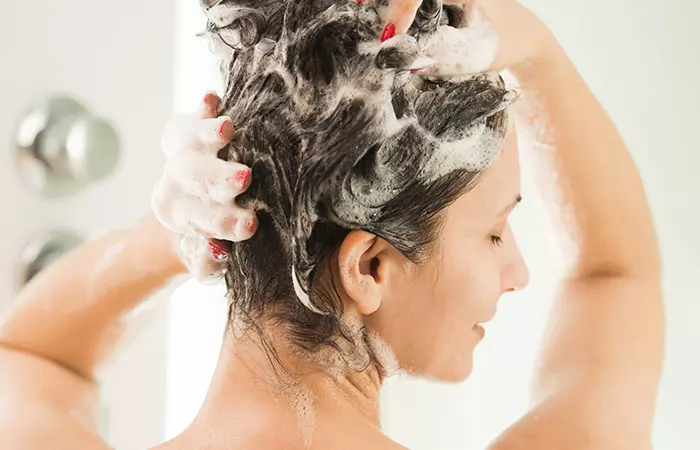
You Will Need
- 1/2 tbsp regular or Himalayan salt
- Tea tree oil
- 1 tbsp shampoo
Prep Time
2 minutes
Processing Time
5 minutes
Process
- Add 2-3 drops of tea tree oil and salt to the shampoo and stir until you get a well-combined mixture.
- Wash your hair with warm water and use the cleansing mixture as you would your regular shampoo.
- Massage your scalp in circular motions with your fingertips to eliminate flakes and buildup.
- After massaging your scalp for a couple of minutes, wash your hair with cool water.
- Finish with a moisturizing conditioner. Apply the conditioner from the mid-lengths to the tips of your hair. Avoid any contact with your scalp to prevent product buildup.
How Often?
2-3 times a week.
Why This Works
The salt in your shampoo helps exfoliate your scalp while also balancing oil production. The antifungal, antibacterial, and antimicrobial properties of tea tree oil can help reduce itchiness and other symptoms of dandruff. It helps absorb the grime and dirt from your scalp while loosening and eliminating dead skin.
2. Salt And Olive Oil For Dandruff
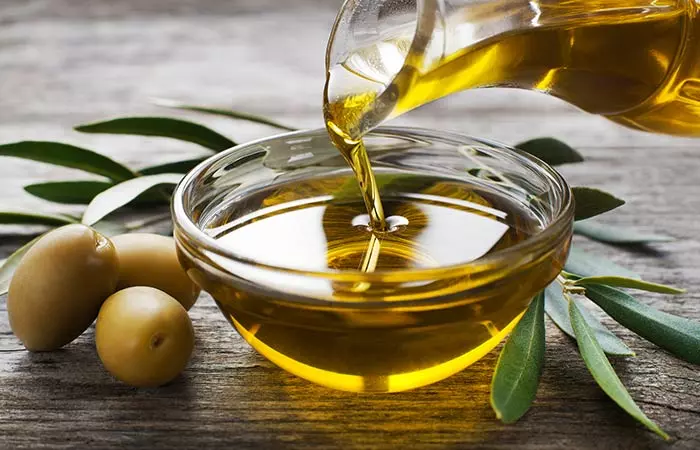
You Will Need
- 2 tbsp dead sea salt
- 1-2 tbsp olive oil
- 1-2 tbsp lemon juice
Prep Time
2 minutes
Processing Time
10 minutes
Process
- In a bowl, mix the ingredients until they are well combined.
- Wet your hair and apply the soothing mixture onto your scalp.
- Once your entire scalp is covered in the mixture, massage it gently in circular motions with your fingertips.
- After massaging for about 5 minutes, rinse the mixture out of your hair.
- Wash your hair with a mild sulfate-free shampoo.
- Finish with conditioner. Apply the conditioner from the mid-lengths to the tips of your hair. Avoid any contact with your scalp to prevent product buildup and greasy, dull hair.
How Often?
Twice a week.
Why This Works
Incorporating hair oils for dandruff into your routine can soothe the scalp and reduce flakiness. Olive oil is an excellent natural conditioner that also helps boost scalp health. The oil helps loosen dead skin while also promoting the growth of healthy skin. It helps soothe your scalp and relieves itching. The vitamin C in lemon juice also helps treat dandruff while giving your scalp a collageni A structural protein that provides structure, support, and strength to your skin, muscles, bones, and connective tissues. boost to improve hair growth.
3. Epsom Salt For Dandruff
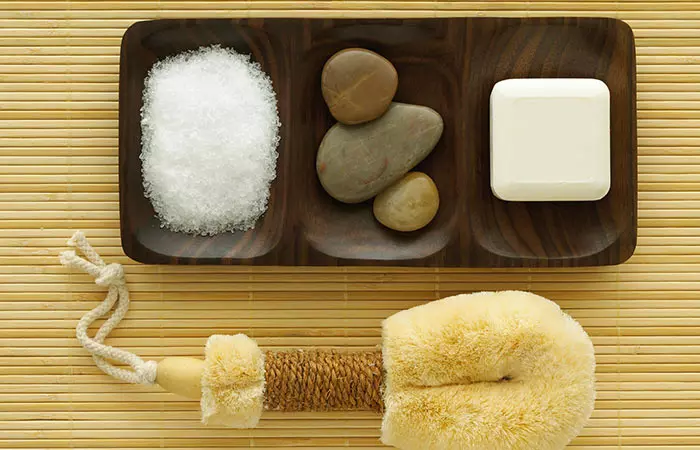
You Will Need
- 2-3 tbsp Epsom salt
- Shampoo
Prep Time
2 minutes
Processing Time
10 minutes
Process
- Wash your hair with warm water until it is completely wet.
- Take the Epsom salt and start gently massaging your scalp with it to exfoliate.
- After massaging for a couple of minutes, wash your hair with your regular shampoo.
- Finish with conditioner. Apply the conditioner from the mid-lengths to the tips of your hair. Avoid any contact with your scalp to prevent product buildup.
How Often?
1-2 times a week.
Why This Works
Massaging your scalp with Epsom salt helps exfoliate it and remove all the dead skin cells. It also effectively banishes grime. You could substitute the Epsom salt in this remedy with regular sea salt.
4. Salt Rinse
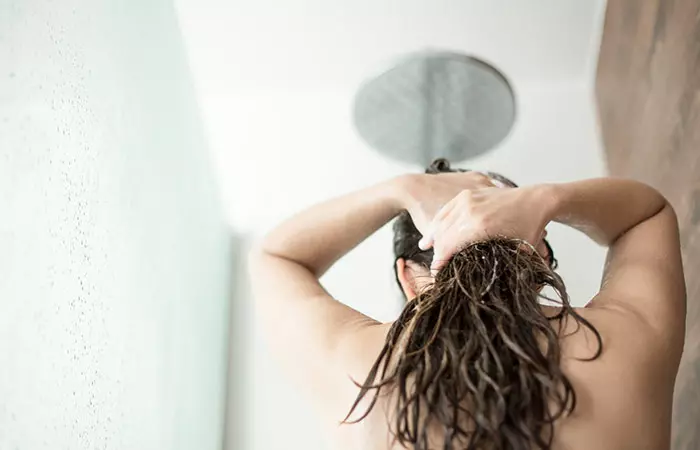
You Will Need
- 3 tbsp salt
- 1 cup water
Prep Time
5 minutes
Processing Time
5 minutes
Process
- Heat the water in a pot and add the salt to it.
- Once the salt has dissolved, turn off the heat and let the solution cool.
- Rinse your hair with the salt solution and massage your scalp for about 5 minutes.
- Rinse the solution out of your hair and proceed to wash your hair with a mild sulfate-free shampoo.
- Finish with conditioner. Apply the conditioner from the mid-lengths to the tips of your hair. Avoid contact with your scalp to prevent product buildup.
How Often?
1-2 times a week.
Why This Works
Massaging your hair with this salt solution will help loosen the flakes and dead skin while also absorbing all the oil and grease present in your hair.
Note: While salt may help exfoliate the scalp, using it frequently or in high amounts may lead to over-exfoliation, which may cause dryness and irritation, particularly for sensitive skin types. To ensure your scalp is well-cared for, it’s best to use salt sparingly and always follow up with a moisturizing conditioner, as mentioned above. Moreover, if you are experiencing a specific hair condition, it would be strongly recommended that you consult a doctor before proceeding with salt treatment.
Mary Godwin, a haircare and lifestyle blogger, tried using salt water to get rid of dandruff and saw visible changes. She used salt mixed in warm water and massaged her scalp with it, noting, “You’ll feel that soothing effect. When it dries, massage with Castor Oil or any thick oil. Do it weekly for effective results or daily depending on how bad the itch or dandruff is (i).”
 Quick Tip
Quick TipInfographic: 4 Ways To Treat Dandruff With Salt
Dandruff can be annoyingly tough to manage. It is caused by the Malassezia fungus that makes the scalp itchy and stinky. However, many natural treatments can help you treat the condition, and salt is one of them. It exfoliates the scalp to loosen up the flakes, remove dead skin, and unclog pores. It might also absorb excess oil from your scalp and prevent sebum buildup and fungal infection. Check out the infographic below to know 4 ways of using salt to deal with dandruff.
Some thing wrong with infographic shortcode. please verify shortcode syntaxTreating dandruff is not an easy task. It is a real annoyance and causes a flaky, dry, and itchy scalp. There are several shampoos and home remedies to treat dandruff issues, but not everyone knows about sodium chloride or salt as a remedy for dandruff. Using salt for dandruff helps clean your scalp, unclog the pores, clean excess oil, and fight fungal infection. However, be cautious that the salt doesn’t build up on the hair. Though it is an excellent cleanser and will help eliminate skin issues, the salt will build up on the hair and need to be clarified at least once a month.
The recipes and methods discussed in the article will make your job easier. The methods shared above will help you learn how to treat dandruff with salt. Following these will be beneficial to combat dandruff.
Learn how to get rid of dandruff with a simple salt treatment. Click on the video below to help get rid of those pesky flakes and have healthy and beautiful hair in no time
Frequently Asked Questions
Does salt turn hair white?
No. Applying salt to your hair does not turn it white or lighten it.
Is salt water good for dry scalp?
No. Salt absorbs excess oil and moisture from the scalp. So, it can aggravate your hair issues if you have a dry scalp.
Is salt or sugar better for scalp scrub?
It depends on your hair type. Salt scrubs are good for oily, dandruff-prone scalps, while hydrating sugar scrubs can soften dry scalp and hair.
Can salt cause hair damage?
Yes, overusing salt on hair can cause dryness or brittleness. It’s best to use it in moderation and follow up with a good conditioner.
How often should I use salt for dandruff treatment?
Using salt as a dandruff treatment once or at max twice a week is generally enough to help exfoliate and reduce flakes without over-drying your scalp.
Personal Experience: Source
StyleCraze's articles are interwoven with authentic personal narratives that provide depth and resonance to our content. Below are the sources of the personal accounts referenced in this article.
i. Effective Remedy For Dandruff And Itchy Scalphttps://kinkchic01.wordpress.com/2015/06/17/effective-remedy-for-dandruff-and-itchy-scalp/
References
Articles on StyleCraze are backed by verified information from peer-reviewed and academic research papers, reputed organizations, research institutions, and medical associations to ensure accuracy and relevance. Read our editorial policy to learn more.
- Skin Care with Herbal Exfoliants
https://www.researchgate.net/publication/224892687_Skin_Care_with_Herbal_Exfoliants - Stratum corneum dysfunction in dandruff
https://www.ncbi.nlm.nih.gov/pmc/articles/PMC3494381/ - Hygroscopic properties of sodium and potassium salts as related to saline mineral dusts and sea salt aerosols
https://www.sciencedirect.com/science/article/abs/pii/S1001074220301273
Read full bio of Madison Dufour
Read full bio of Arshiya Syeda
Read full bio of Ramona Sinha
Read full bio of Monomita Chakraborty






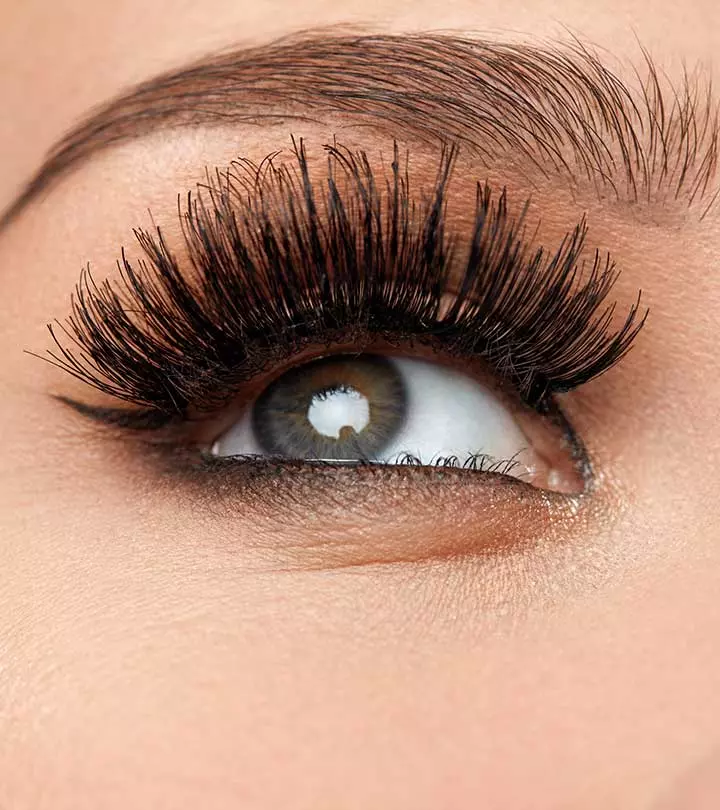
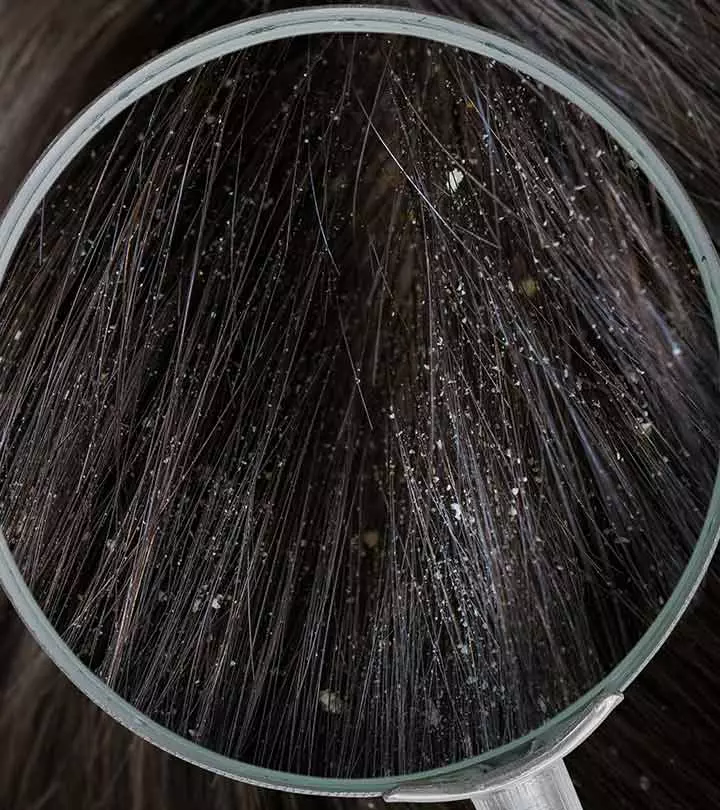

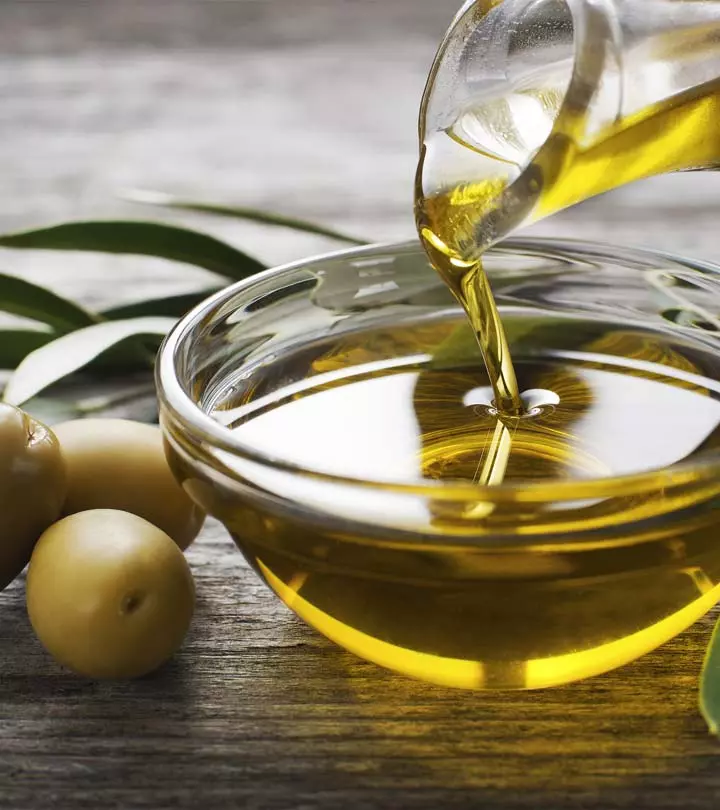
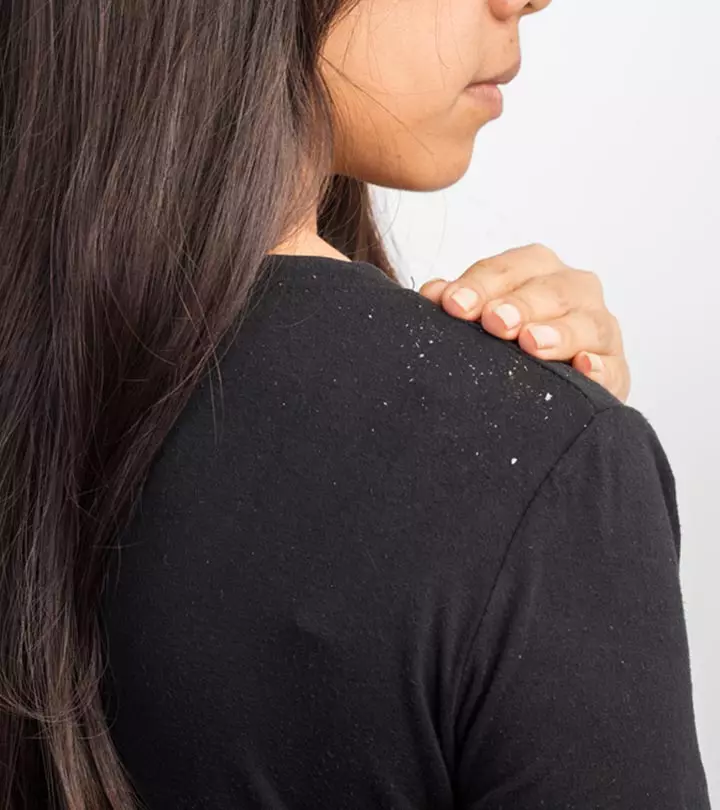
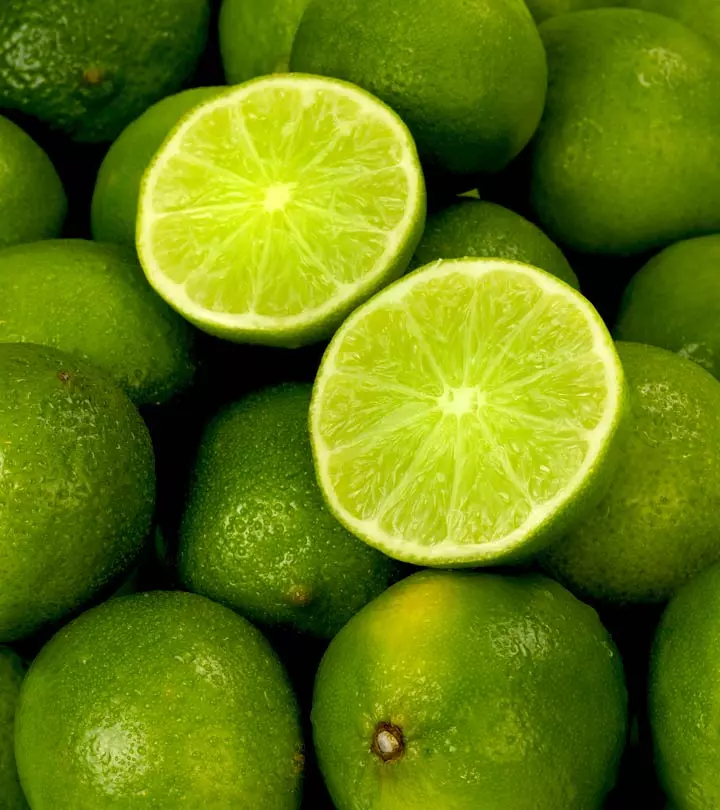



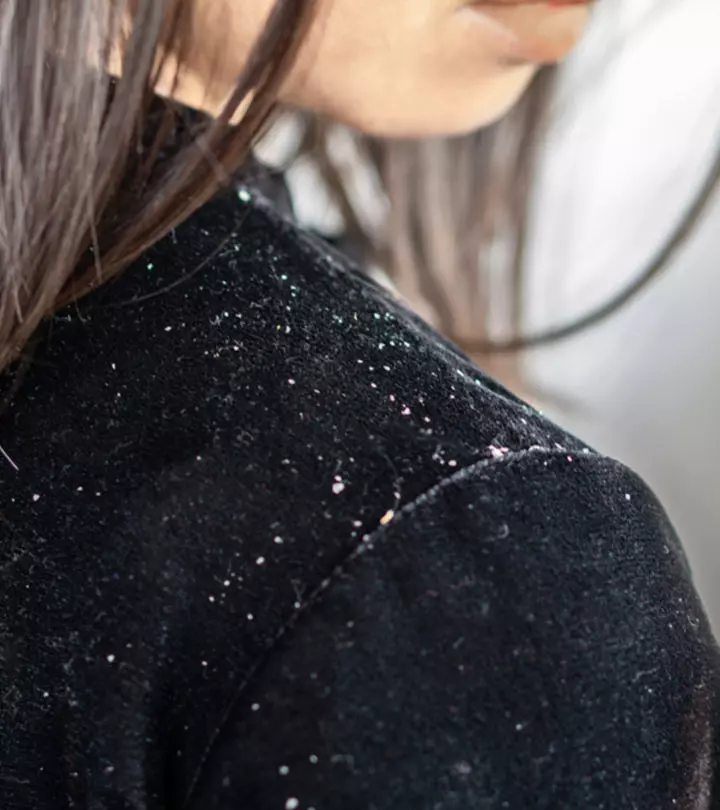
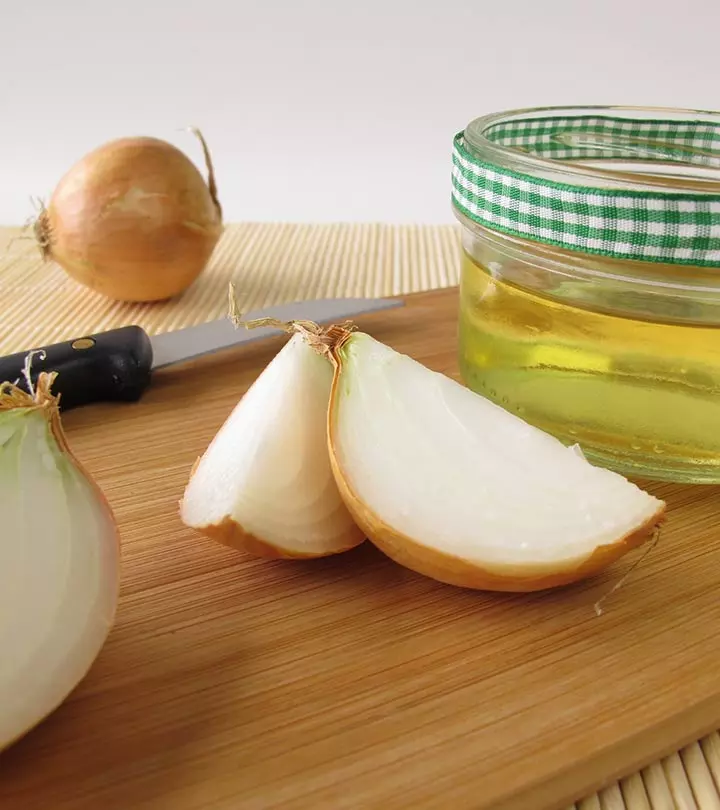
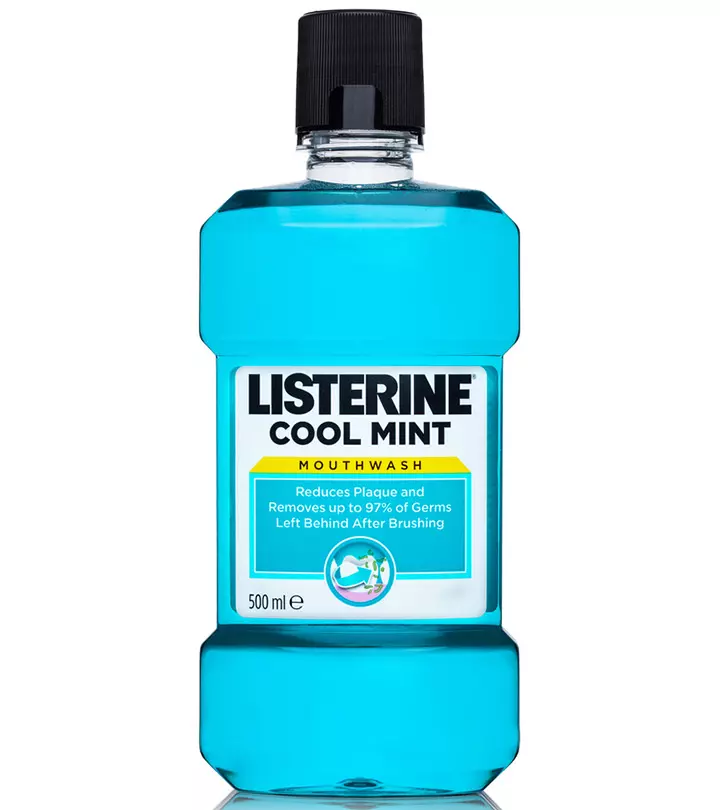
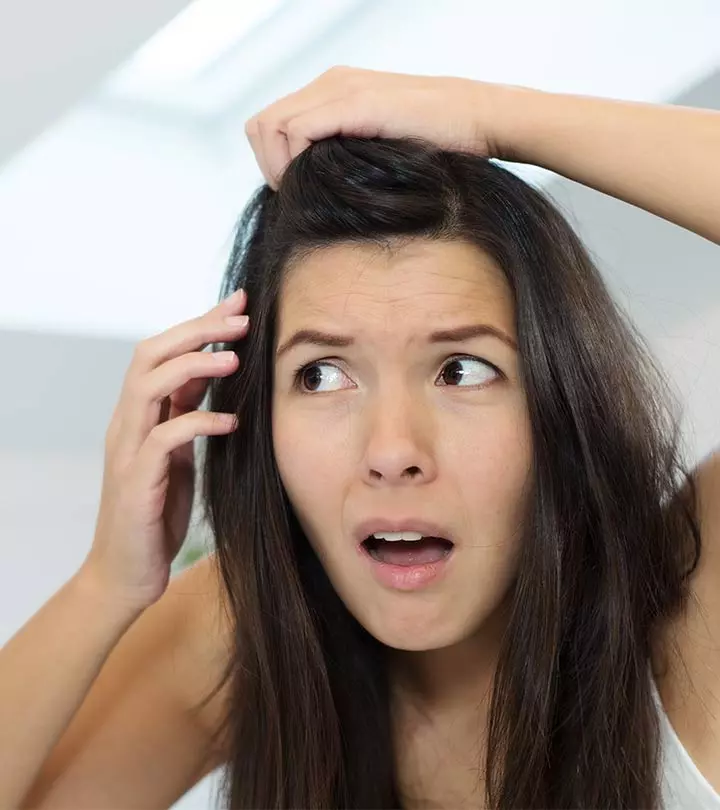
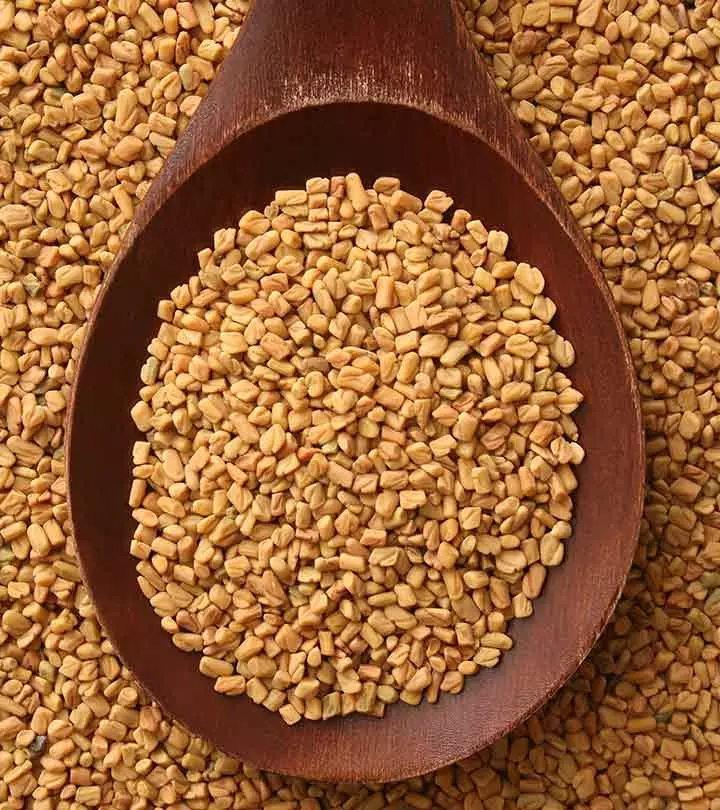

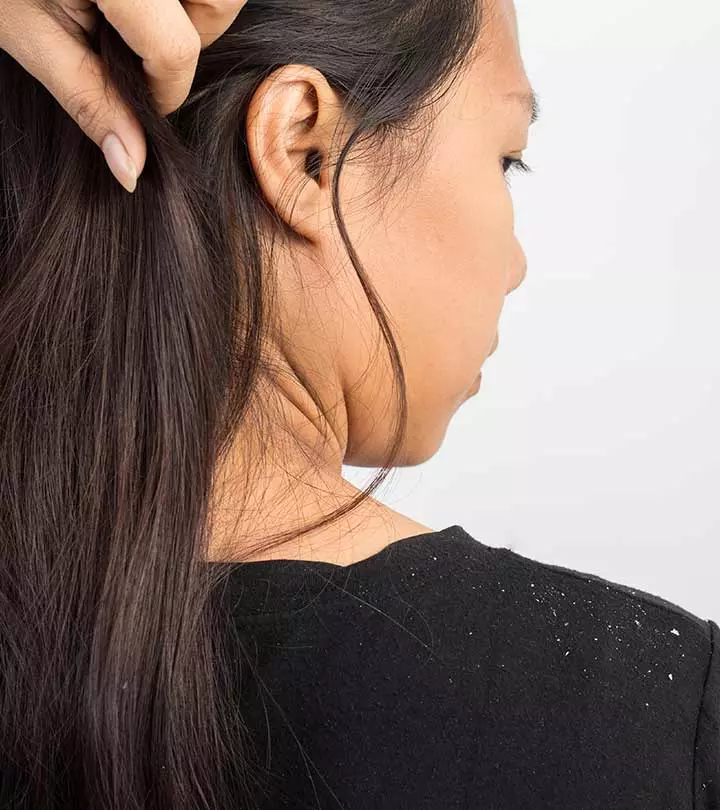
Community Experiences
Join the conversation and become a part of our empowering community! Share your stories, experiences, and insights to connect with other beauty, lifestyle, and health enthusiasts.